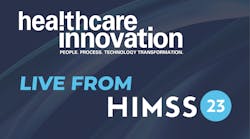Frederick Health Chronicles its Precision Medicine Journey
On Thursday, April 20 at HIMSS23, being held at the McCormick Place Convention Center in Chicago, Jackie Rice, B.S.N., R.N., vice president for information technology and chief information officer, Frederick Health and Kristin Conley, M.D., chief medical information officer, Frederick Health presented an educational session entitled “How and Why to Launch a Precision Medicine Program.”
Frederick, Md.-based Frederick Health is a not-for-profit health system that was founded in 1902. The system has 24 locations, more than 100 providers, and has 20 unique specialty areas of care.
After Rice gave a brief overview of genomics and genetic sequencing, she said, “Genomic medicine is one of the fastest growing fields in healthcare. COVID mRNA vaccines were only possible with breakthroughs in genomics and genetic sequencing.”
“[At Frederick] we really believe genetic testing is the right thing to do for our community,” she added.
Yet, Rice explained that there are challenges for provider organizations when it comes to genomics. The challenges include:
- Technical challenges
- Identifying third-party partners
- Putting the right people in place
- Payer reimbursement
- Negotiating prices and logistics
- Developing partnerships and communication
- Education of providers
- Education of patients
One of the key technical challenges Rice highlighted is the challenges surrounding having genetic testing information in the electronic health record (EHR). Discrete data, according to Rice, has been a real problem, but Frederick puts the discrete data into the EHR through standard interfaces. EHR systems were not built with housing genetic testing data in mind.
Conley explained, “Long before we decided to bring the discrete data into the EHR, we launched a precision medicine oncology program.” The Frederick Health Precision Medicine Program is meant to provide a high quality and cost-effective services and provide patients with tailored treatment based on a gene informed approach. Additionally, the program aims to expand access to genetic and genomic information for improved patient outcomes and access to clinical trials. The program utilizes genomics for disease prevention and treatment with the goal of improving population health.
As for patients’ reactions, “Patients want testing and don’t want to beak the bank to get it.” She added that without any kind of insurance or reimbursement a genetic test costs approximately $276.
Conley then asked, “Why pharmacogenomics?” The two main problems that can be solved are:
- Will a medication work as expected?
- Will the risk of side effects be increased?
“Budgets are tight right now,” Rice said. The way approval happened at Frederick Health with the CEO, was that his mother had genetic testing done due to a medication not working well. He was sold on the concept almost immediately.
As for what’s next for Frederick Health, initiatives include:
- Nutrigenomics
- Collaboration with NIH for research/Monthly Genetic Tumor Board Meeting NIH/Frederick Health
- Refining KPIs and developing analytics dashboards
- Integrating with three additional labs this year for discrete genetic data
Both presenters concluded by stressing that genomics is the future of medicine. In 10 years, we may be asking how we ever diagnosed and practiced medicine without it.


